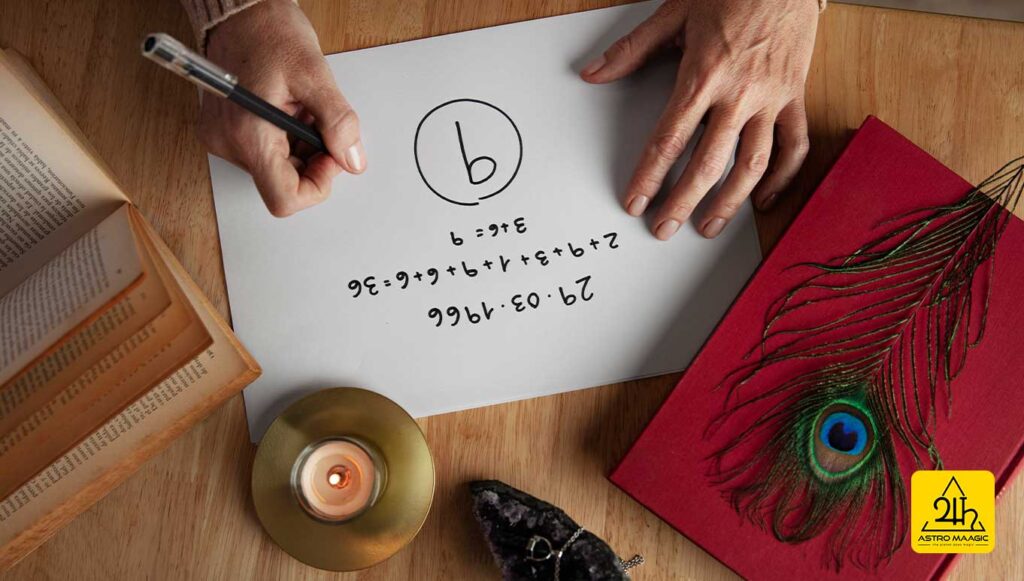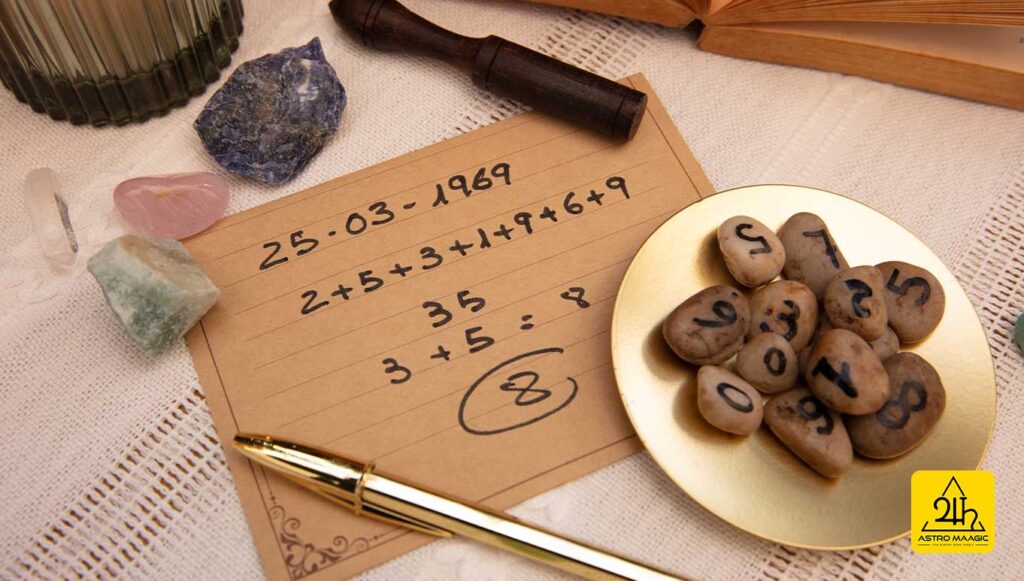What To Know About Numerology?

Numerology is simply one of the metaphysical sciences concerned with numbers and how they relate to their life events, the root of which goes back to ancient times in Hindu Indian astrology. Numbers produce vibrations and energies that affect all aspects of an individual’s life. Much of the work in numerology is purely understanding these vibrations and how they relate to individual lives, thus providing insight into one’s personality traits, natural strengths and weaknesses, one’s purpose in life, and possible outcomes for the future.
Zodiac Signs in Love: How Each Sign Approaches Relationships
Aries (March 21 - April 19)
Passionate and bold, Aries loves with intensity and excitement. They crave adventure and thrive in relationships filled with spontaneity and challenge. Aries is fiercely loyal but needs a partner who can keep up with their dynamic energy and independent spirit.
Taurus (April 20 - May 20)
Stable and devoted, Taurus seeks a deep, lasting connection built on trust and security. They love romance, physical affection, and consistency in a relationship. While incredibly loyal, Taurus can be stubborn and needs a patient partner who appreciates their sensual and reliable nature.
Gemini (May 21 - June 20)
Playful and curious, Gemini loves engaging in conversations and mental stimulation in relationships. They need variety and excitement and are often drawn to partners who challenge them intellectually. Gemini sometimes struggles with commitment but thrives when given space to explore and express themselves.
Cancer (June 21 - July 22)
Deeply emotional and nurturing, Cancer seeks a soulmate connection. They value security and devotion, often putting their heart and soul into relationships. Though sensitive and sometimes guarded, they offer unwavering love and support once they trust someone.
Leo (July 23 - August 22)
Confident and charismatic, Leo loves grand gestures and being adored. They bring warmth, loyalty, and passion to relationships but expect appreciation in return. Leo thrives with a partner who admires their strength while also being able to hold their own in the relationship.
Virgo (August 23 - September 22)
Thoughtful and devoted, Virgo expresses love through actions rather than words. They are practical, detail-oriented, and seek a partner who values loyalty and effort. While they may overanalyze relationships at times, Virgo loves them deeply and consistently once they feel secure.
Libra (September 23 - October 22)
Romantic and charming, Libra values balance and harmony in relationships. They seek a deep emotional and intellectual connection with a partner who shares their love for beauty, conversation, and companionship. Libra can struggle with decision-making but is deeply committed when in love.
Scorpio (October 23 - November 21)
Intense and passionate, Scorpio loves with depth and devotion. They crave emotional intimacy and honesty, often seeking a soulmate-level connection. Though protective of their heart, Scorpio is one of the most loyal and transformative partners once they trust.
Sagittarius (November 22 - December 21)
Free-spirited and adventurous, Sagittarius values excitement and independence in love. They thrive in relationships that allow for exploration and growth. While they can be commitment-shy, a deep mental and philosophical connection keeps them engaged long-term
Capricorn (December 22 - January 19)
Responsible and dependable, Capricorn approaches love with dedication and a long-term vision. Although they may take time to open up, they offer stability and unwavering support to the right partner. Capricorn values ambition and commitment, seeking a partner who shares their goals.
Aquarius (January 20 - February 18)
Unique and independent, Aquarius values mental connection and shared ideals in a relationship. They are free thinkers who seek a partner who respects their individuality. While emotionally reserved at times, Aquarius loves deeply in their own unconventional way.
Pisces (February 19 - March 20)
Dreamy and romantic, Pisces loves with deep emotion and intuition. They crave a soulmate connection and are incredibly compassionate partners. Pisces thrives with someone who understands their sensitive nature and reciprocates their emotional depth.
Main Principles of Numerology

The idea of numerology begins with assigning numbers to letters in a person’s name and date of birth. Then, those digits are calculated by a particular formula or system, and meanings are drawn from them. The resultant numbers, called life path numbers or destiny numbers, are supposed to say something important about the individual’s character, life’s journey, and karmic lessons learned.
5th House (House of Progeny):
The most significant house for childbirth and fertility. A well-placed 5th lord and Jupiter indicate a healthy pregnancy, while afflictions may lead to delays or complications.
9th House (House of Fortune & Blessings):
This house represents divine blessings, family expansion, and overall luck in childbirth. A strong 9th house enhances the chances of conception.
2nd House (House of Family & Lineage):
Governs family growth, financial stability, and the ability to provide for children. A well-placed 2nd lord ensures a prosperous upbringing for the child.
8th House (House of Transformation & Medical Concerns):
Influences reproductive health, medical interventions, and pregnancy risks. Malefic influences can indicate C-sections, miscarriages, or other complications.
7th House (House of Marriage & Spouse):
The 7th house represents the spouse’s role in pregnancy. A harmonious 7th house ensures marital support and a positive environment for conception.
A detailed analysis of these houses helps predict fertility, pregnancy health, and potential remedies for any issues.
Second Marriage Predictions
• Concerned about second marriage prospects? We offer detailed astrological consultations for second or re-marriages.
• Get clarity on potential partners, timing, and dosha solutions for a harmonious future.
Numerology and Indian Astrology
Varna (1 point)
Assesses spiritual and mental compatibility based on caste classification.
Vashya (2 points)
Determines the level of mutual influence and control between partners.
Tara (3 points):
Examines health, well-being, and destiny alignment.
Yoni (4 points)
Represents physical attraction and sexual compatibility.
Maitri (5 points)
Measures friendship, emotional connection, and intellectual bonding.
Gana (6 points)
Evaluates temperament compatibility (Deva, Manushya, Rakshasa).
Bhakoot (7 points)
Analyzes financial stability and family well-being.
Nadi (8 points)
Checks genetic compatibility and future progeny health.
Numerology and Indian astrology are interlinked and complementary sciences. They work with the same numeric values and derive the same inferences, in most cases complementing each other to a great extent to reduce things into a whole. Indian astrology thrives entirely on planetary positions and draws lines concerning human lives. When mixed with such things, numerology adds another layer regarding those numbers and vibrations associated with the name and date of birth.
Jupiter (Guru)
The most important planet for children and fertility. A well-placed Jupiter ensures blessings for childbirth and a healthy pregnancy, while its affliction may cause delays.
Moon (Chandra)
Represents emotional well-being, menstrual cycles, and maternal instincts. A strong Moon promotes a stress-free pregnancy, while a weak or afflicted Moon may lead to emotional instability or hormonal imbalances.
Venus (Shukra)
Governs fertility, reproductive health, and conception ability. A strong Venus increases the chances of a smooth pregnancy, while malefic effects may lead to hormonal issues or infertility.
Saturn (Shani)
Brings karmic lessons and may delay pregnancy if afflicted. However, Saturn’s influence can also bring stability in later stages.
Rahu & Ketu
Shadow planets that indicate complications, miscarriages, or medical interventions. Their placement in the 5th house may require remedies.
Mars (Mangal)
Represents physical strength and energy, but its affliction can lead to pregnancy complications like miscarriages, surgeries, or high-risk pregnancies.
A thorough planetary analysis helps determine the best time for conception and remedies for a healthy pregnancy.
Applications of Numerology
Numerology finds application in various areas of life, including:
Self-Discovery and Personal Growth
Numerology can help individuals gain deeper insights into their personality traits, strengths, weaknesses, and life's purpose. This self-awareness can facilitate personal growth and informed decision-making.
Career Guidance
By analyzing an individual's numerological profile, numerologists can suggest suitable career paths and professions that align with their talents and skills.
Relationship Compatibility
Numerology can be used to assess the compatibility between individuals based on their numerological charts. This can help choose life partners, business associates, and friends.
Predictive Purposes
Some numerologists use numerology to forecast future trends and events in an individual's life. However, it is essential to note that numerology is not a foolproof prediction method and should be used cautiously.
Numerology, with its rich history and profound insights, continues to fascinate and intrigue people across cultures and generations. Whether used for self-discovery, career guidance, relationship compatibility, or predictive purposes, numerology offers a unique and valuable perspective on the intricate relationship between numbers and human lives.
Historical Context
The historical roots of numerology in India are deeply intertwined with the ancient practice of Vedic astrology, also known as Jyotish. This connection is evident in the numerous references to the significance of numbers in understanding cosmic patterns and human destiny found within revered texts like the Vedas and Puranas. These ancient scriptures highlight the belief that numbers hold the key to unlocking the mysteries of the universe and the individual’s place within it.
“Ank Shastra,” which translates to “the science of numbers,” is a cornerstone of Indian spiritual traditions. This practice is not merely a mathematical calculation but a profound exploration of the vibrational energies and symbolic meanings associated with each number. Through Ank Shastra, practitioners seek insights into various aspects of life, including personality traits, relationships, career paths, and spiritual growth. Integrating numerology with Vedic astrology allows for a comprehensive understanding of the individual’s karmic journey and the cosmic influences that shape their life.
Core Principles
Birth Number (Moolank)
The birth number is derived from the day of your birth. For example, if you were born on the 15th, your birth number is 1+5=6. This number reveals your basic personality and inherent traits.
Destiny Number (Bhagyank)
The destiny number is calculated by adding all the digits of your full birth date (DD/MM/YYYY) until a single digit is obtained. This number indicates your life's direction and major challenges.
Name Number (Namank)
The name number is derived by assigning numerical values to each letter of your name and then summarising them. This number influences your social interactions and external persona.
Number Meanings in Indian Numerology
Number 1 (Sun)
Represents leadership, independence, and ambition. Individuals with this number are often pioneers and innovators.
Number 2 (Moon)
Symbolizes emotions, intuition, and diplomacy. These individuals are sensitive and nurturing.
Number 3 (Jupiter)
Associated with wisdom, optimism, and creativity. People with this number are often teachers and advisors.
Number 4 (Rahu)
Represents practicality, discipline, and organization. These individuals are hard-working and detail-oriented.
Number 5 (Mercury)
Symbolizes communication, adaptability, and freedom. Individuals with this number are versatile and quick-witted.
Number 6 (Venus)
Associated with love, harmony, and beauty. People with this number are often artistic and sociable.
Number 7 (Ketu)
Represents spirituality, introspection, and mystery. These individuals are philosophical and intuitive.
Number 8 (Saturn)
Symbolizes discipline, responsibility, and karma. People with this number are often ambitious and resilient.
Number 9 (Mars)
Associated with courage, energy, and passion. Individuals with this number are often dynamic and assertive.
Applications of Numerology
Career Guidance
Numerology can offer career suggestions by analyzing your core numbers, revealing your inherent talents and potential career paths that align with your natural abilities.
Relationship Compatibility
By comparing core numbers, numerology can illuminate relationship dynamics, highlighting potential areas of harmony and conflict between individuals.
Personal Growth
Understanding your numerological profile fosters self-awareness and personal development, allowing you to effectively leverage your strengths and address your weaknesses.
Auspicious Timing
Numerology can identify favourable dates for important events by analyzing numerological vibrations, potentially increasing the likelihood of success.
Numerology and Vedic Astrology

In Indian astrology, numerology is closely linked to the nine planets (Navagraha). Each number is associated with a specific planet, influencing its characteristics and effects. In Indian astrology, numerology is deeply intertwined with the celestial bodies known as the Navagraha (nine planets). Each number from 1 to 9 is associated with a specific planet, and this connection significantly influences the characteristics and effects attributed to that number. For instance, the number 1 is associated with the Sun, imbuing it with leadership, individuality, and ambition qualities. The number 2 resonates with the Moon, linking it to emotions, intuition, and adaptability. This intricate relationship between numbers and planets forms the foundation of numerological analysis in Indian astrology, where an individual’s destiny and personality traits are deciphered based on their birth number and the corresponding planetary influences.
Remedies and Practices
Based on numerological readings, specific remedies and practices, such as mantras and gemstone recommendations, can be suggested to mitigate negative influences and enhance positive ones.
Mantras
Specific sounds, syllables, or phrases repeated to create vibrations that align with desired outcomes. These mantras can be personalized based on your numerological profile.
Gemstones
Wearing gemstones associated with specific numbers or planets can help balance energies and attract positive influences.
Colour Therapy
Using colours associated with your lucky numbers in your surroundings or clothing can enhance positive vibrations.
Meditation
Regular meditation practice can help you connect with your inner self and align with the positive energies of the universe.
Affirmations
Regular positive statements can reprogram your subconscious mind and attract desired outcomes.
Yantras
Sacred geometric diagrams used for meditation and energy balancing.
Name Correction
In some cases, it may be recommended that you change the spelling of your name slightly to align with favorable numerological values.
Nadi (8 points)
Checks genetic compatibility and future progeny health.
These remedies and practices can mitigate the challenges associated with specific numbers in your chart and enhance their positive qualities. It’s important to consult a qualified numerologist to determine the most suitable remedies for your needs.
Conclusion
Numerology, particularly from an Indian astrological viewpoint, offers a valuable method for self-understanding and navigating life’s challenges. Exploring the significance of birth, destiny, and name numbers allows individuals to gain deeper insights into their potential and purpose. For further exploration and personalized guidance in numerology and related astrological practices, visit astromaagic.com.

